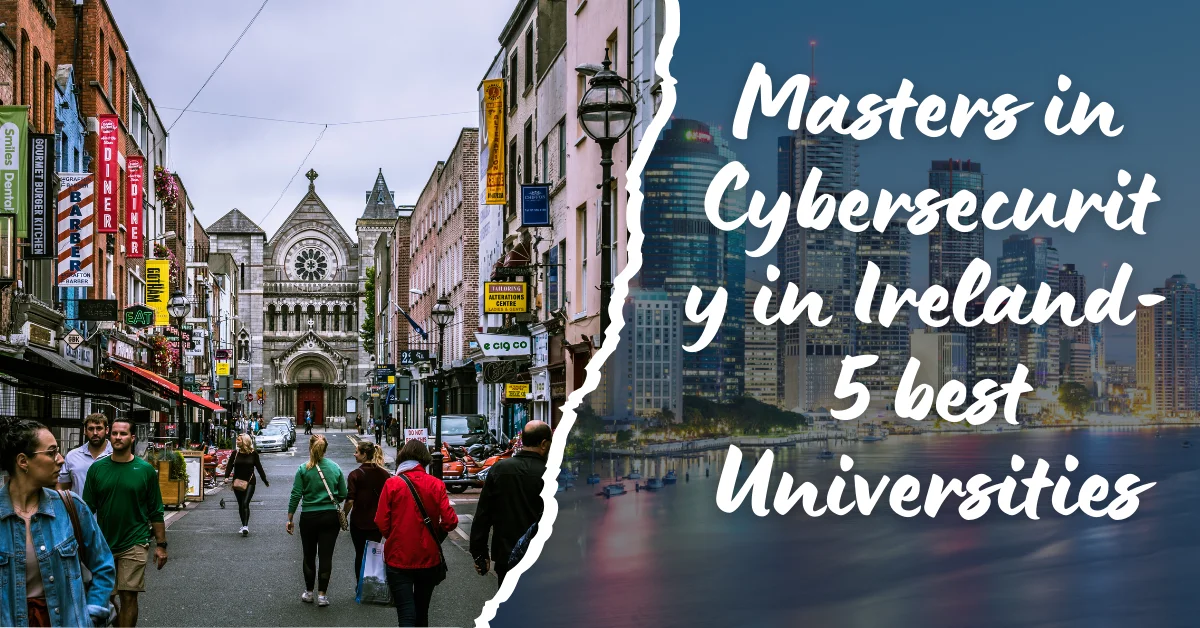Are you ready to unlock the door to a thriving career in cybersecurity abroad?
Cyber threats have grown tremendously, and the need for experts to protect important data and information has also increased tremendously.
If you are thinking of building your tech career, a Master’s in Cybersecurity in Ireland might be the course you are searching for.
Ireland has something unique with tech and a world-class university that would place you among academia and, at the same time, provide practical experience that will help you solve real-world problems.
This blog will tell you everything about MSc in Cybersecurity in Ireland. From course overviews and key facts to program outlines and career prospects, we’ll cover everything you need to know to make an informed decision.
Cyber Security Masters in Ireland

Ireland has become one of the best study-abroad destinations for cybersecurity education. Its world-class Master’s programs prepare students for the ever-evolving digital landscape.
The programs combine theoretical knowledge with practical skills, equipping graduates to handle cybersecurity challenges in the real world.
Program structure and duration
Most of the Cyber Security courses in Ireland have a similar program structure as follows:
- Duration: Typically 1-2 years full-time, with part-time options available
- Credits: Usually 90-120 ECTS credits
- Modules: Combination of core and elective modules
- Dissertation: Research project or industry placement
Key focus areas
Cyber security courses in Ireland cover a wide range of essential topics, such as:
- Network Security
- Cryptography
- Ethical Hacking
- Digital Forensics
- Information Security Management
- Cloud Security
- IoT Security
- Artificial Intelligence in Cybersecurity
Comparison of Top Programs
Here’s a comparison of some leading Masters in Cybersecurity programs in Ireland:
| University | Program name | Duration |
| Trinity College Dublin | MSc in Computer Science- Future Networked Systems (Cyber Security) | One year |
| University College Dublin | MSc in Cybersecurity | Two year |
| University College Cork | MSc in Cyber Risk for Business | One year |
| University of Galway | MSc in Cybersecurity Risk Management | One year |
| National College of Ireland | MSc in Cybersecurity | One year |
Career opportunities
As a graduate of Cybersecurity Masters programs in Ireland, you can get jobs or build your career in the following fields:
- Cybersecurity Analyst
- Information Security Manager
- Penetration Tester
- Digital Forensics Specialist
- Security Architect
- Compliance Officer
The demand for cybersecurity professionals in Ireland and globally continues to grow, offering excellent career prospects for students.
Key facts
Duration and format
- Program Length: 1-2 years (full-time)
- Part-time options available at select institutions
- Combination of lectures, practical labs, and research projects
Admission requirements
- Bachelor’s degree in Computer Science, IT, or related field
- Minimum 2:1 honours or equivalent
- English language proficiency (IELTS 6.5 or equivalent)
- Some programs may require work experience
You can view the admission requirements for each university from their website.
Course outline
Core Modules
The Master in Cybersecurity program in Ireland typically consists of core modules that provide a strong foundation in essential cybersecurity concepts and practices.
These modules equip students with the knowledge and skills necessary to tackle complex security challenges in the digital world.
- Network Security
- Cryptography and Secure Communications
- Information Security Management
- Ethical Hacking and Penetration Testing
- Digital Forensics
- Secure Software Development
Specialised Tracks
Many universities in Ireland offer specialised tracks within their cybersecurity programs, allowing students to focus on specific areas of interest. These tracks may include:
- Cloud Security
- IoT Security
- Artificial Intelligence in Cybersecurity
- Blockchain Security
Elective Courses
To allow for personalisation of the degree, you can often choose from a range of elective courses such as:
- Advanced Malware Analysis
- Security in Cloud Computing
- Mobile and Wireless Security
- Cybersecurity Law and Ethics
Certifications
Many Masters in Cybersecurity programs in Ireland align their curriculum with industry-recognized certifications, including:
- Certified Information Systems Security Professional (CISSP)
- Certified Ethical Hacker (CEH)
- CompTIA Security+
- Certified Information Security Manager (CISM)
This alignment helps students prepare for these valuable certifications alongside their degrees, enhancing their employability upon graduation.
Why choose this course?

The Master’s in Cybersecurity in Ireland perfectly combines academic excellence and practical industry exposure.
- Ireland’s universities are at the forefront of research and innovation in cybersecurity so that students can learn the most advanced knowledge and skills.
- This program has strong ties with industry leaders so that graduates will be well-equipped for the fast-changing cybersecurity landscape.
- The qualification is globally recognised, and an Irish institution offers a Master’s in Cybersecurity.
- The degree allows graduates to find opportunities worldwide and work with multinational corporations, government agencies, and leading technology companies.
- Ireland and the world over, jobs in the field of cybersecurity are on the rise. Here’s a snapshot of the career opportunities:
| Role | Average Salary | Growth rate |
| Information Security Analyst | €65,000 – €85,000 | 31% (Much faster than average) |
| Cybersecurity Consultant | €70,000 – €100,000 | 28% |
| Penetration Tester | €60,000 – €90,000 | 25% |
| Security Architect | €90,000 – €120,000 | 22% |
Irish cybersecurity programs offer diverse specialisations, including:
- Network Security
- Cloud Security
- IoT Security
- Artificial Intelligence in Cybersecurity
- Blockchain and Cryptography
This will allow you to build your career per your interests and goals.
What are Ireland Cyber Security Masters fees?
International students generally pay higher tuition fees, ranging from €15,000 to €25,000 per year.
This difference reflects the additional resources and support services provided to international students.
Here are the fees from different universities to study cybersecurity in Ireland:
| University | Tuition fees |
| National College of Ireland | €17,000 |
| Trinity College Dublin | €26,989 |
| University College Dublin | €21,220 |
| University College Cork | €26,000 |
| University of Galway | €21,000 |
Additional Costs to Consider
When budgeting for your Master’s in Cybersecurity, keep in mind these additional expenses:
- Registration fees
- Course materials and textbooks
- Specialised software licenses
- Accommodation costs
- Living expenses
Part-Time Work Opportunities
Many cybersecurity programs in Ireland allow you to work part-time during your studies.
This can offset living expenses and provide valuable industry experience.
Conclusion
A master’s degree in cybersecurity in Ireland provides a perfect and up-to-date program in an emerging field.
Many students registered in cyber security programs continue to learn with properly designed syllabi, which provide knowledge and coping strategies for current-day cyber threats.
A special emphasis on applying the acquired skills and real business needs guarantees that the program will produce professional cybersecurity graduates ready to meet the local and international labour market demand.
It is advisable for those who want to build a career in this important area to pursue a master’s degree in cybersecurity in Ireland. Employer support is high, and this program’s tuition cost is reasonable.
It provides a chance to master a skill set that will produce professional services for a constantly expanding field. Continue your learning journey by learning more about this cybersecurity course and how to apply now!





























3 Responses
Your ability to distill complex concepts into digestible nuggets of wisdom is truly remarkable. I always come away from your blog feeling enlightened and inspired. Keep up the phenomenal work!HABANERO88
Your blog is a constant source of inspiration for me. Your passion for your subject matter shines through in every post, and it’s clear that you genuinely care about making a positive impact on your readers.SABA303
I have been surfing online more than 3 hours today yet I never found any interesting article like yours It is pretty worth enough for me In my opinion if all web owners and bloggers made good content as you did the web will be much more useful than ever before.